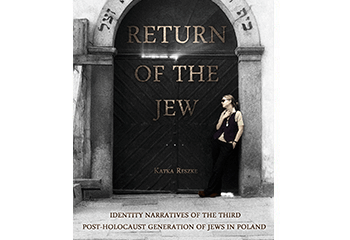“Return again, return again, return to the land of your soul.
Return to what you are,
return to who you are, return to where you are
born and reborn again…”
I heard these lyrics for the first time while at the historic Temple Synagogue in Krakow four years ago on the opening night of the Jewish Culture Festival. The predominantly Polish crowd enthusiastically cheered the performing chazzanim. The place was bright and bursting. Large cantors displayed even larger personalities. Then, the unassuming Cantor Yaakov Lemmer rose to the bimah. He appeared to be about my age, and from his slight form came a big voice, singing: “Return again, Return to the land of your soul.”
Having spent months reflecting on the idea of “returning” to a place where I had never been, I was taken by his rendition of the Carlebach song, feeling as though I had “returned to the land of my soul.” I had finally come to the land, which I had long yearned for in my soul with a mixture of awe, sadness and profound curiosity.
Ideas of returning more fully to one’s self, of being renewed and reborn again are major themes of the High Holidays, centering on the concept of tshuvah. Often translated as repentance, tshuvah means return. The song, which affected me deeply in Krakow, was written for the High Holidays. What does it mean to “do tshuvah” – to perform a process of returning?
“What constitutes complete tshuvah?” asks Maimonides in the Laws of Tshuvah. “He who is confronted by the identical situation wherein he previously sinned, and it lies within his power to commit the sin again, but he nevertheless does not succumb, because he wishes to repent.”
Indeed, tshuvah is not only about asking for forgiveness but about a soul-searching, penitential reversal of inclinations. I am focused on reversing inclinations that were bred in me toward a place and people I never knew first-hand. My tshuvah involves replacing stereotypes of Polish people with actual relationships, and returning to a fuller picture of Poland as a centre of 1,000 years of Jewish heritage, not just a site of extermination.
The essential quality of tshuvah is core to the topic of contemporary Polish-Jewish life and our relationship to it as Canadian Jews. On one hand, there is the “returning Jew” to Poland who makes a physical journey from abroad to retrace her roots across the Polish landscape. Then there is the “return of the Jew” in Poland – to borrow from the title of a book by Katka Reszke on reclaimed Polish-Jewish identity – the one who, raised in Poland, begins a journey of identity formation upon discovering her Jewish familial roots.
In addition to Reszke’s book, several recent cultural projects echo the core “tshuvah quality” of the Polish-Jewish conversation. The Canadian performance piece We Keep Coming Back, created by Michael Rubenfeld and Sarah Garton Stanley together with Reszke and Michael’s mother, Mary Berchard, examines the relationship of this mother-son duo to their wounded family past in Poland. In the play, their story parallels Reszke’s own return to Judaism as a native Pole with a Jewish heritage that was concealed from her. Similarly, the 2014 documentary, The Return, by Adam Zucker, follows four young Polish women struggling with defining their Jewish identities in Poland today.
It is no accident that the language of tshuvah – of returning – factors prominently in these artistic endeavours as well as the captivating performance by Cantor Lemmer that I experienced. These creative figures lead us into tshuvah in arenas that are painful and complicated to navigate alone.
Rabbi Yishmael says: “If tshuvah were not created, the world could not stand.” The very stability of our world is sustained by the potential for change by shedding the fear and resentment that barricade us from our true selves. On that night in the Temple Synagogue, celebrating life and culture together as Jews and Poles in Poland, I felt that we were joined in an ongoing process of performing tshuvah
